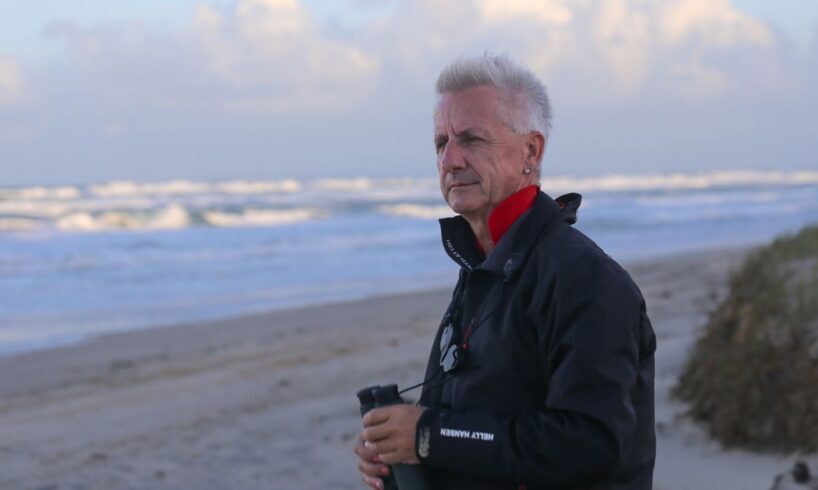
A Queensland ecologist who suggested 4WDs should be partially banned on the beach to protect wildlife is refusing to back down after being flooded with death threats.
University of the Sunshine Coast Professor Thomas Schlacher called on the government to consider outlawing all-terrain vehicles on parts of the sand due to the irreversible damage it causes to marine creatures.
He took his family to the United States for a period earlier this year when vitriol from some 4WD drivers became so inflamed that he was even sent a letter that read “we know where you live”.
Professor Thomas Schlacher said he wont “budge” on his plea to change the rules for 4WD beach driving. (Supplied)
Schlacher has since resumed his vocal opposition of 4WD beach tourism – and told nine.com.au he won’t stop advocating for Australia’s vulnerable beach creatures.
“Very little can live on those beaches,” Austrian-born Schlacher said
“We cannot, in this dire age, carry on for the benefit of a few who are just basically ‘petrolheads’, to compromise ecosystems which belong to our children, our grandchildren and future generations to come.”
Schlacher publicly revealed his new research earlier this year which found widespread 4WD use on beaches causes serious harm to birds and impacts long-term conservation.
On a recent visit to a beach in Queensland, he found a bird that had been critically injured after being hit by a 4WD.
Schlacher has since resumed his vocal opposition of 4WD beach tourism. (Supplied)
”People actually going directly at birds, driving straight at them, trying to hit them,” he said.
Schlacher’s environmental plea caught the attention of the 4WD community in Australia.
He soon began receiving death threats, cruel messages and sinister letters.
“It is very scary. It actually goes beyond just being a keyboard warrior,” Austrian-born Schlacher said.
“This is actually personal and directed… there was another [comment] coming through, which said ‘How many college professors can we bury on a beach?’
“I had a note in my postbox. And it basically said, ‘we know where you live’. And there was a photo of my car.”
Schlacher said he has seen birds killed by 4WDs in Queensland. (Supplied)
Schlacher said while he has been “distressed” by the threats on his life, he remains steely in his resolve.
After 30 years of work on beaches, the professor said he has concluded 4WDs are persistently wiping out entire marine ecosystems.
“The evidence is massive and it’s solid and it’s unambiguous. It’s worldwide,” he explained.
“And you can just basically say it is the worst thing you can do in terms of how to use a beach.”
Schlacher said some of the worst 4WD damage is being inflicted on Queensland’s Bribie Island, where up to 1000 4WD drivers head to the sand on a busy weekend.
There is a 23 kilometre one-way stretch on Ocean Beach which legally allows 4WDs on the sand.
But Schlacher said his plea to conserve some parts of the beach from 4WDs has so far been unanswered by the state government.
4WD driving is allowed on Bribie Island. (Supplied)
He also said Queensland Minister for the Environment and Tourism Andrew Powell’s dual portfolio represents a conflict of interest.
“The government only listens to the 4×4 lobby” Schlacher claimed.
“Because they’re powerful and as you have seen, they’re violent.”
Schlacher pointed out he has not called for a blanket ban on 4WDs on beaches.
He explained a “reasonable” starting point would be setting aside half the beach in popular spots across Queensland, Victoria and NSW for 4WDs, and conserving the other half.
4WD driving is allowed on Bribie Island. (Queensland Government)
“Even that seems to be not be heard,” Schlacher added.
“But I’m not going to budge from that.”
Minister for the Environment, Tourism, Science and Innovation Andrew Powell:
Queensland boasts some of the most biodiverse landscapes on the planet – our iconic environment is part of our world-renowned reputation, and it is this government’s privilege to protect it.
In the same way, tourism is a core industry our state depends on, supporting one in 11 jobs and fuelling a more than $40 billion visitor economy that keeps Queensland running. One cannot thrive without the other.
Ecotourism depends on a healthy, well-managed environment, and that’s exactly what our Destination 2045 plan delivers – sustainable experiences that showcase our natural wonders while inspiring people to protect them for generations to come.
We have no plans to restrict access to beaches in key tourism areas like Bribie Island. But we expect everyone to do the right thing: follow the rules, respect wildlife, and keep these areas pristine.
Our rangers work alongside the Queensland Police Service to enforce a zero-tolerance approach to dangerous driving and environmental damage, and every dollar from camping and vehicle permits goes straight back into managing these areas.
Because protecting our natural environment isn’t negotiable – it’s what makes Queensland the home of the holiday.





